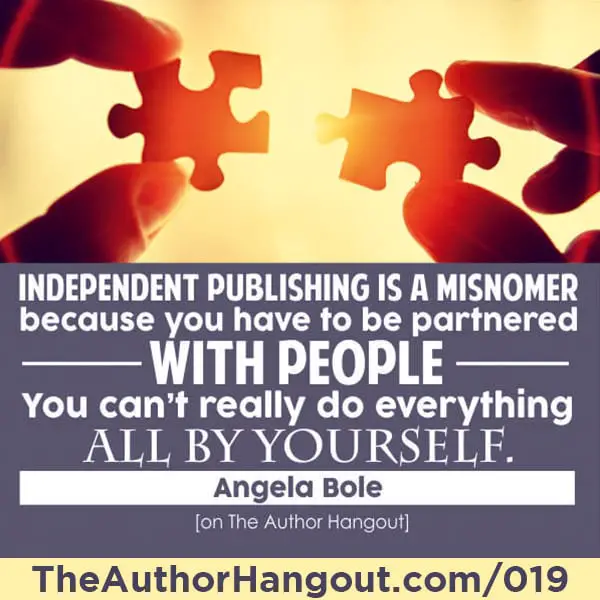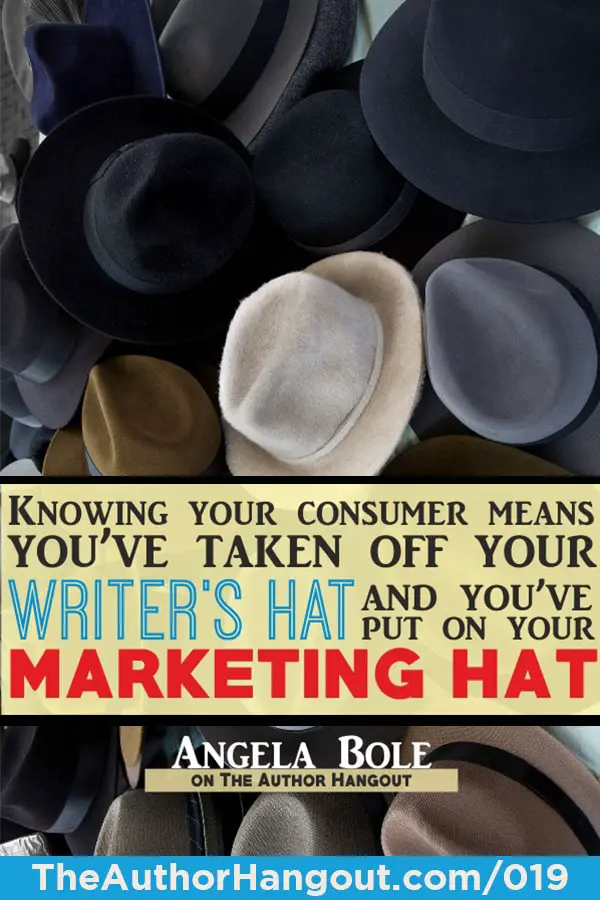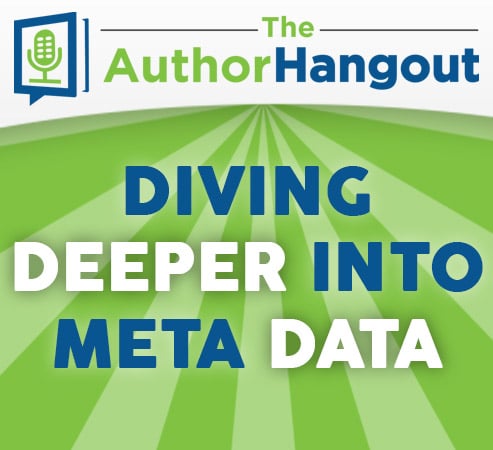Welcome to the 19th episode of The Author Hangout, a “Hangout on Air” designed to help authors, especially self-published and indie authors, with marketing their books and improving their author platform. Authors struggle with various aspects of marketing and we are here to help!
“Independent publishing is a misnomer, because you have to be partnered with people. You can’t really do everything all by yourself.”– Angela Bole
Diving Deeper Into Meta Data
When people see your book, what do they pretty much always look at first? The cover. While the cover is an extremely important part of the puzzle, it’s not the only piece. The meta data, the information about your book, is extremely important as well, especially in this digital age where people are searching for books like yours using data-driven search engines such as Google or Amazon.
We were joined by Angela Bole, the Executive Director of the Independent Book Publishers Association. She discussed the importance of meta data, some tips for getting your meta data right, and some other helpful tips when it comes to the business side of being an independent publisher.
The Author Hangout – Episode 19: “Diving Deeper Into Meta Data”
Listen to the Show / Podcast
Podcast: Play in new window | Download (23.0MB)
Subscribe: RSS
Episode Resources:
- FREE: The Ultimate Author Checklist for Online Book Marketing
- Independent Book Publishers Association
- Publishing University

Intro
Angela Bole shared about how she got involved with the Independent Book Publishers Association, and what the IBPA does to help authors.
Be sure to listen to the interviews to get those insights.
Why should authors and publishers consider being a part of the IBPA?
 This is what Angela had to say:
This is what Angela had to say:
“There’s an ability to upload content and to become ubiquitously available, but then there’s all the other things that have to happen and all the other things you need to understand about publishing as a business that isn’t necessarily intuitive. Isn’t at all intuitive in some cases, because our industry has spent hundreds of years building up these partnerships and these arrangements that we make with each other and use agreements that we have between trading partners. So members of IBPA, I think they have an in track through the ability to gain that knowledge, information, resources. We have a monthly magazine that’s free to members that’s filled with tips and real experience from members. So that’s I think important in and of itself.”
She then hit the nail on the head:
“Independent publishing I think would be a misnomer, because you have to be partnered with people. You can’t really do everything all by yourself.”
Learn more about the IBPA here.
What is the current state of independent publishing?
We threw this massive question at her, but Angela responded in stride:
“I think it’s blown up to a degree. It feels like it’s possible to get in the door because it truly and really is possible to get in the door. And for a lot of people, indie publishing, self-publishing, it’s not a default choice anymore. It used to be you couldn’t get picked up by a publisher, so now I’m just going to figure out how to pull my content out, push my content out on my own. But nowadays, you see a lot more authors making this conscious choice, for whatever reason – lots for times for financial reasons, but for other reasons as well. Creative control being a big reason why you might want to keep the content under your “publishing umbrella.” So I think it’s exciting because all of that is happening, but it’s also exciting because within all of that churn, there are all of these opportunities to really help people understand why the publishing process works as it does and how you can be successful within this process.”
What is currently working for the authors you’ve seen?
 Since she connects with a lot of authors, we wanted to get her take:
Since she connects with a lot of authors, we wanted to get her take:
“Knowing your consumer is a big one I think for indie authors coming in. And knowing your consumer means you’ve taken off your writer’s hat and you’ve put on your marketing hat to a degree, because you do have to know your reader when you’re writing, maybe. Or maybe you’re just writing the best thoughts you can come up with. But you’re trying to understand your reader, and that definitely transfers into the business of publishing. So understanding who that person is and how you’re going to now structure what you’re going to say about your book and where you’re going to place your book and all the things – the way your book looks and the content, so that it really is relevant to this consumer that you’ve defined for yourself, has been – that’s number one.”
What is meta data?
Shawn had met Angela when she was giving a talk on meta data at PubSmart 2014:
“I think most people are familiar with the term in a general sense; it’s really just information about information. That might be the definition of metadata. It’s essentially everything you could possibly say about your book, broken down into ever-finite chunks of information, ever-finite chunks of data. When we talk about metadata, we talk about metadata elements. There are different metadata elements, and an element related to your book metadata might be your author name, your title – which is different from your subtitle – your author bio, your book description. Of course, now you’re starting to see we’re talking about things that describe your book. We’re also in metadata, though, talking about other things. We’re talking about translational information – information not necessarily just for the consumer, but information for your trading partners, like do you have the territorial rights? What rights are those? What’s the weight and the size of the book?”
While some of these definitely apply to digital publishing, like on Amazon, etc, there are also a bunch of concerns that independent publishers need to consider when dealing with print, and larger distribution when you’re dealing with print books.
Why is meta data so important?
“I think because people still get it wrong, crazy enough. We still get metadata wrong so often because we don’t pause to pay attention to the rules. There are rules related to this information and how it should be expressed. And when you don’t express it correctly in terms of its format, for example – and one example of format might be in the metadata, you may need to do your author last name, first name. Or you may need to do your author full name straight out. This is a format for the content, and if you don’t do it right in format and/or in kind in the content of it, then you’re losing sales. Because you’re not getting represented appropriately on browsers, on internet sites where your book is meant to now be booked. No one can pick up your book anymore in their hand and read it as much as you’d want; they have to understand everything about your book from what you tell them through your metadata. So if you’re not giving them metadata correctly, so it’s rendering wrong on all the search engines, or it just isn’t reading well, then you’re going to lose sales and you’re going to look less professional.”
How can you choose the right meta data for your book?
“I think choosing – it becomes interesting for an author, and you’re now becoming a publisher, and now you’re doing your own metadata. You’re choosing it, but you’re really writing it. You’re making these conscious choices about how you’re now going to talk about the content of your book or your book in different ways. How do you choose the right metadata? Some metadata is chosen for you. You have an ISBN, you have a title. Now all you’ve got to do is make sure that you format your ISBN and your title correctly. There’s no magic there. But there’s other subjective pieces of metadata, like your book description is a really good example to think about as somebody who’s going to write your own metadata. Because there’s not just one book description; there’s probably three, maybe four different opportunities for book description in our current metadata standards. There’s a short one, there’s a medium-sized one, there’s a really long one, and you have to write all of them. You really do need to consider – let’s say the real estate I have on this website is only this long. I really need to hone in then on only this, and make sure that that’s really clean and clear. Or let’s say they give me more space; that’s great. You have more things to write. But that doesn’t mean that your most important information still doesn’t need to be at the very top of your description.”
She shared some other great things to think about when considering the meta data for your book. While some might not apply to you right now, it is definitely something you may need to be thinking about if you plan to grow and reach more and more readers in new and different formats.
What can authors do to stay on top of the latest trends in publishing?
“Just schedule 15 minutes. Take your Outlook calendar and schedule 15 minutes, half hour, whatever you can spare. You think you can’t spare any time, but I promise you can spare 15 minutes and use that time for research for making sure that you’re reading on the relevant blogs, that you’re checking in on who’s doing what, that you are understanding what your peers are trying to accomplish and you’re having a point of view about that. It’s either like the coolest thing you’ve ever seen or you really don’t understand why they’re going in that direction, but you do see that there are all these directions you can move in.”
How is editing a book part of the marketing process?
“There can be a little bit of a flippant feeling about “Just push the content out. Push it out. We can fix it, we can fix it,” because a lot of these things will happen digitally, and you really can fix it. But your point is well made; again, this is your calling card. Your book is your calling card. If you put something in front of the consumer with errors, they’re not going to come back, really. Unless you’ve got the best story in the universe – and I am one that believes that story sells. Story will sell above editing, right? That’s cool. If you missed a few commas and you missed a couple words, but you are entertaining the heck out of somebody, then they’ll stick with you. But in the middle of it all, we’re doing a little bit of both. We’re doing a professional presentation and a really good story, if not the best story you’ve ever read in your life. So I think that really does matter.”
If an author started today, what would you recommend to help that author succeed?
We love asking this question because it gets to the heart of it, and provides some actionable tips:
“There’s a mental switch I would recommend wherein you’ve thought of yourself as an author for so long, potentially; now you are a publisher. You have a different job to do. So there are other things to consider, and I think sometimes it’s difficult to turn off that one thing, take off that one hat and put on the other. But that’s really important, because now you understand there’s a whole new profession that is to be learned. So that would be one thing; get yourself mentally prepared for what you’re going to be walking into. And then, again, I would do all the research that I could. I would make as many connections as I could. I would not be a wallflower; I would join as many message boards that I could find. Obviously, I would join IBPA and I would connect to members and to our office and try and figure out what people are doing to get started. I would make myself available. And I would – this is an interesting tip that I think really works: I would find people that are doing things like me. If you’re a romance writer or a genre writer of any kind, or a nonfiction historical writer, find people that are doing things like that. Befriend them in the profession. Start to comment on their books; start to send their books to your friends. Because you build that trust in that community, and then they say “You’re part of us”; then they start sharing your book with their friends. So the more you can give, I think the more you’re going to start to get back as well in these spaces. But again, it’s going to be all about your professionalism and the partners that you build, the community that you pull in, and your ability to really educate yourself on a new side of business, a new profession.”
Wrap Up
Angela shared a ton of great insights for those authors who may be new to publishing or who are finding themselves struggling. Dial in your meta data, know your consumer, and start pursuing them!
Please Leave Us A Review
Just like authors do with their books, we need reviews for our podcast! Reviews for our podcast help other authors to learn about and learn from The Author Hangout. Can you take a moment to leave a review for our podcast? If you don’t know how but are willing to leave a review, please go here to learn how to leave a quick review for our podcast. It will only take a minute, but it will help a lot.
Thank you so much!
How To Watch/Listen
There are many ways to watch and listen to the show:
- Right here… You can watch the video above or listen to the audio version as well!
- You Tube… You can go here to watch the video on YouTube! Be sure to subscribe so that you don’t miss future videos.
- iTunes… Our podcast is up and running on iTunes! Click here to listen to past episodes and subscribe for free to be notified of all future podcasts!
- Stitcher… If you prefer Stitcher for your podcast listening, you can listen to our podcast here.
Other Episodes
Get caught up on the other episodes of The Author Hangout that you may have missed:
- Ep 145: “Million Dollar Book Business”
- Ep 144: “Network Net Worth”
- Ep 143: “Learning to Hack Learning”
- Ep 142: “Making Of The Perfect Optin”
- Ep 141: “Coaching Breeds Author Success”
- Ep 140: “Gumroad for Authors”
- Ep 139: “Above The Noise”
- Ep 138: “Goal Setting Check-in”
- Ep 137: “Relying On Others”
- Ep 136: “Honest Conversations on Book Marketing”
- Ep 135: “Recognition of Hard Work”
- Ep 134: “Improving Kindle Book Rankings”
- Ep 133: “Making Money Fast?”
- Ep 132: “Book Marketing & Book Launches”
- Ep 131: “Authors Answers: How To Get Book Reviews”
- Ep 130: “Author Answers: Author Street Teams”
- Ep 129: “Author Answers: Using KDP Select or Not”
- Ep 128: “Traffic, Subscribers, and Sales”
- Ep 127: “Book Marketing Tips from Experts (Part 7)”
- Ep 126: “Media Interviews & Book Marketing”
- Ep 125: “Book Marketing Tips from Experts (Part 6)”
- Ep 124: “Goal Setting for Authors”
- Ep 123: “Author Answers: Social Media Engagement”
- Ep 122: “Speaking, Podcasts & Mailing Lists”
- Ep 121: “Authors Answers: DIY Blog Tours”
- Ep 120: “Book Launches & Pay-Per-Click Advertising”
- Ep 119: “Author Answers: Choosing Comparison Titles”
- Ep 118: “Writing as a Career & Audiobooks”
- Ep 117: “Self-Publishing & Book Launches”
- Ep 116: “Podcasting for Book Marketing”
- Ep 115: “Author Answers: Best Marketing Activities”
- Ep 114: “Book Launches & Video Marketing”
- Ep 113: “Writing Faster, Marketing Smarter”
- Ep 112: “Book Marketing Momentum”
- Ep 111: “Building Book Launch Teams”
- Ep 110: “Book Launches and Distribution”
- Ep 109: “Email Lists & Facebook Live”
- Ep 108: “Facebook Ads for Book Marketing”
- Ep 107: “NaNoWriMo, Writing, and Marketing”
- Ep 106: “Book Marketing Success & Failure”
- Ep 105: “Telling Stories & Reaching Readers”
- Ep 104: “Connect With Other Authors”
- Ep 103: “Maximizing Your Book Marketing”
- Ep 102: “Audiobooks and Book Marketing”
- Ep 101: “Author Email Marketing Automation”
- Ep 100: “Looking Back, Looking Forward”
- Ep 099: “Maximizing Book Promotions”
- Ep 098: “Meta Data Is Your Brand”
- Ep 097: “Kindle in Motion & More”
- Ep 086 – How To Create an Irresistible Opt-In Incentive

